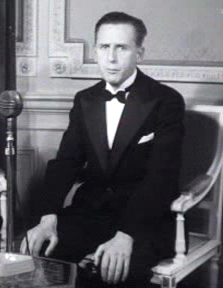William Haley: Difference between revisions
img. |
mNo edit summary |
||
| Line 23: | Line 23: | ||
'''Sir William John Haley''', [[Order of St Michael and St George|KCMG]] (24 May 1901 - 6 September 1987) was a [[United Kingdom|British]] newspaper editor and broadcasting [[Administration (business)|administrator]]. |
'''Sir William John Haley''', [[Order of St Michael and St George|KCMG]] (24 May 1901 - 6 September 1987) was a [[United Kingdom|British]] newspaper editor and broadcasting [[Administration (business)|administrator]]. |
||
==Biography== |
|||
Early in his career on the ''[[Manchester Evening News]]'', Haley was found to be too shy to work as a reporter. He was then transferred to [[Copy editing|subediting]].<ref>Harold Evans, ''Essential English for Journalists, Editors and Writers'' 2000 p.10</ref> |
Early in his career on the ''[[Manchester Evening News]]'', Haley was found to be too shy to work as a reporter. He was then transferred to [[Copy editing|subediting]].<ref>Harold Evans, ''Essential English for Journalists, Editors and Writers'' 2000 p.10</ref> |
||
Revision as of 13:01, 21 June 2010
William Haley | |
|---|---|
 | |
| Born | William John Haley 24 May 1901 |
| Died | 6 September 1987 (aged 86) |
| Education | Cambridge University Dartmouth College |
| Occupation(s) | Editor and director-general of the BBC |
| Spouse | Susan Gibbons |
Sir William John Haley, KCMG (24 May 1901 - 6 September 1987) was a British newspaper editor and broadcasting administrator.
Biography
Early in his career on the Manchester Evening News, Haley was found to be too shy to work as a reporter. He was then transferred to subediting.[1]
He served as Director-General of the BBC from 1944 to 1952 and from 1952 to 1966 he was editor of The Times. He was made Knight Commander of the Order of St. Michael and St. George in 1946.
He was editor in chief of Encyclopædia Britannica from January 1968 until resigning in April 1969 in an editorial dispute over how to adapt the work to new readers. It was reported that younger executives (including the company's president, Charles E. Swanson) wanted to introduce livelier materials, while Haley favoured the traditional approach and an expansion in size.[2]
Sources
